Faith

What makes a god worthy of worship? A heavy question, and probably not one you’d expect from the Marvel Cinematic Universe. But writer, director Taika Waititi’s latest film, Thor: Love and Thunder, takes aim at that very question.

I was in elementary school when the first Harry Potter books were published in the United States. At the time, I was a painfully shy and awkward child; I treasured my library card and found solace in the stacks of books I carried home from our local branch. Though I was a prime target for a sensational new children’s book series, my parents — like the rest of our fundamentalist Baptist church — deemed anything about witchcraft inappropriate reading for good Christian children.

When it was announced that Super Bowl LVI would be held in Los Angeles, advocates for the unhoused in the city knew what would come next. We’ve seen it year in and year out.
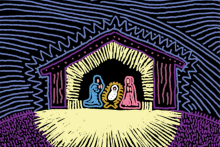
At its core, the Christmas story is radical. Christ enters the world in the form of a marginalized infant — a story about finding hope amid brokenness by pushing forward into the darkness. We cannot find the true light of Christmas without understanding what it means to be in the dark, opening our eyes to the injustices in our neighborhoods.

Communities of faith should be an intentional place for survivors of domestic violence to find healing, refuge, and safety. However church can also be an unsafe place that hinders the process of healing. The steps, responses, and practices offered in this article are meant to be a beginner’s guide to what congregations — including lay members — need to know about preventing, recognizing, and responding to domestic abuse in their midst.

In 1855, the Ojibwe people signed a treaty in Washington, D.C., that retained extensive land use rights in the Great Lakes region for hunting, gathering, fishing, and worship rights for the community. Today, the Ojibwe, who live throughout Minnesota, North Dakota, Wisconsin, Michigan, and Ontario, Canada, still retain these 1855 treaty rights, which are separate from reservation land.
But the Line 3 Replacement Project is seeking to cut through the land, which activists say would directly violate those treaty rights.

Theological language might seem out of place from an organizer in a secular union, but faith has been a constant piece of the campaign in Bessemer. While the first vote was a loss for Retail, Wholesale and Department Store Union, the historic effort offers important lessons for the relationship between faith, labor organizing, and the struggle for racial justice.

"[DMX] taught us how to channel our anger, our passion, our aggression but showed us all we were still human in it all," Steve Patton said.
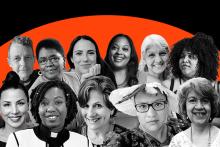
Collectively, this group envisions and works toward a wide and bold church community that cares for creation, centers those who the church has historically marginalized, and holds both political and faith leaders accountable.

On Aug. 19, as she accepted the Democratic nomination for vice president of the United States, Harris quoted 2 Corinthians 5:7 expressing her commitment “[t]o the Word that teaches me to walk by faith, and not by sight. And to a vision passed on through generations of Americans ... of our nation as a Beloved Community — where all are welcome, no matter what we look like, where we come from, or who we love.”
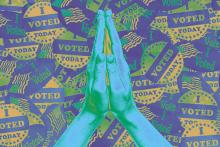
Faith communities across the U.S. are looking to help further democracy by ensuring that 100 percent of the eligible voters in their congregations turn out for the 2020 election.

Voter intimidation — harassing voters, spreading misinformation, or asking them about their citizenship — is never allowed under federal law. And many states prohibit explicit electioneering, such as handing out pamphlets endorsing a specific candidate. But when it comes to apparel, state laws and enforcement vary.
Climate music, baby Yoda, women in church leadership, and more on this week's Wrap.
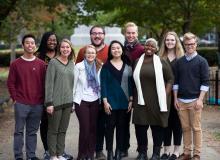
Living in the intentional community feels like living with nine incredible siblings. Holding faith, justice, and empathy as a foundation, we actively choose to get to know each other and allow ourselves to be known.
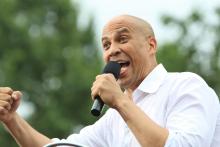
In the second season of The Soul of the Nation, Jim Wallis is sitting down with some of the presidential candidates to discuss how their faith informs their work. Following is a transcript of Wallis’ interview with Sen. Cory Booker, discussing Booker’s faith, the role of faith in the public square, his favorite hymn, and more.
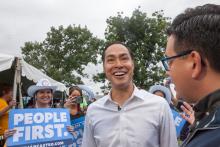
In the second season of The Soul of the Nation, Jim Wallis is sitting down with some of the presidential candidates to discuss how their faith informs their work. Following is a transcript of Wallis’ interview with Julián Castro, discussing Castro’s Catholic faith and upbringing, why Democrats should talk more about religion, and more.

Though I was never a missionary in the standard sense of the word, never proselytized or attempted to save souls, the engine driving me was the white savior complex. I thought the dark bodies living in the developing world needed us white, Western, Christians. The other Westerners I worked with believed we had it all pretty much figured out. We had the right theology. We had the right answers. We had the expertise. We were the so called “whole” condescending to help the “broken.”
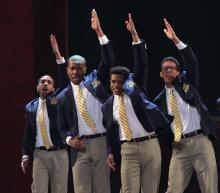
Good theater contains a strain of that gospel antidote, that powerful tradition of trying to name and recognize our demons and human propensities. The earnestness in story that pairs what we believe with what we do, can serve as a way to handle truths about ourselves and our dealings that make us uncomfortable. Often written off as fluffy and as a less effective means of activism, the tradition of plays and musicals has the power to stage an inner confrontation in real time, asking the audience to contend with a hard truth or recasting a social norm we seldom question.

Significantly, official restrictions on Muslim women’s dress don’t satisfy these basic requirements. From Belgium to Kazakhstan to Kenya, education is unavailable and inaccessible to students who choose attire that the government disfavors. If they are forced to pursue studies in private institutions with sometimes inferior resources, curricula, and instruction, then education is more likely to be unacceptable.
